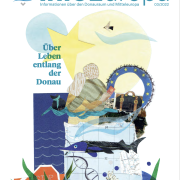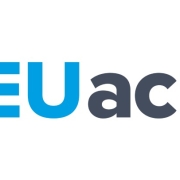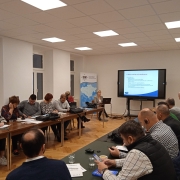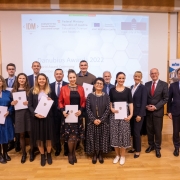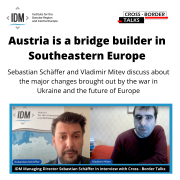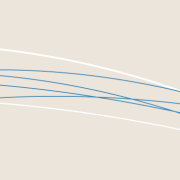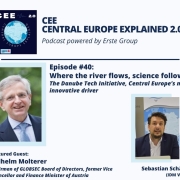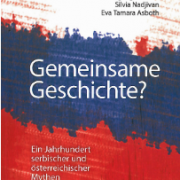Danubius Awards 2022
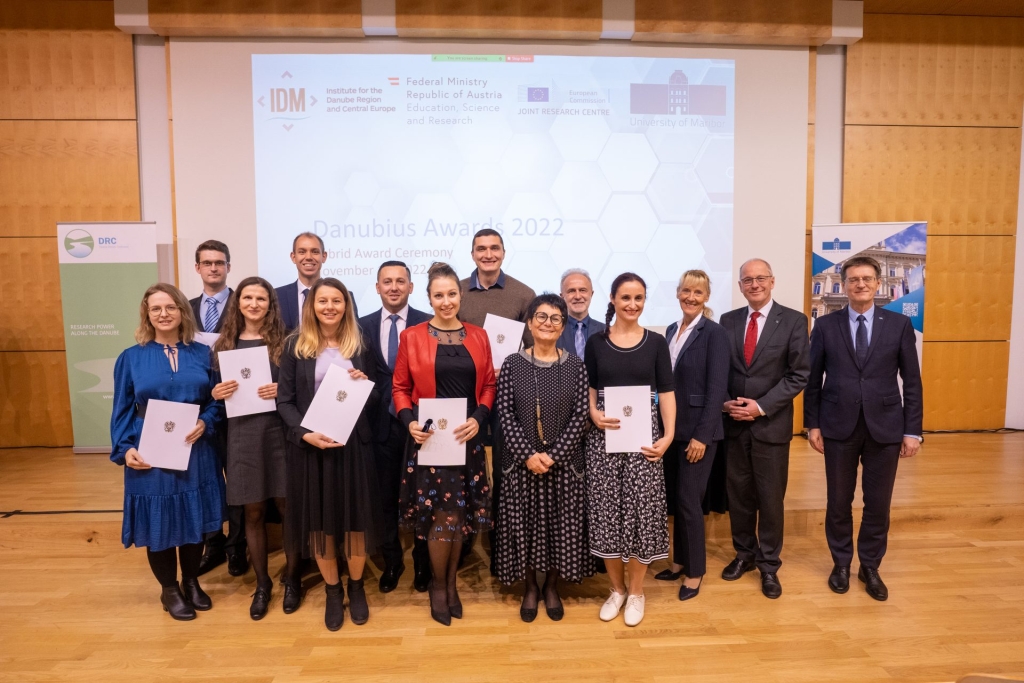
Danubius Award 2022 to the Bulgarian scientist Prof. Dr. Diana Mishkova, Danubius Mid-Career Award to Ukrainian scientist Assoc. Prof. Dr. Tamara Martsenyuk and Danubius Young Scientist Awards to 13 promising researchers from the Danube region.
The “Danubius Award” 2022 goes to Bulgarian Prof. Dr. Diana Mishkova, History Professor and Director of the Centre for Advanced Study (CAS) in Sofia, Bulgaria. With her work focusing on modern and contemporary history of Eastern Europe, the modernization of South-Eastern Europe, European societies, and European peripheries as well as national identities, she has contributed profoundly to research on the Balkans. She is o the funding director of CAS Sofia, that is supported by numerous international sponsors, such as the Wissenschaftkolleg Berlin (Institute for Advanced Study Berlin). Prof. Dr. Mishkova has already received several awards for her scientific work and is involved in different international projects – currently in the Horizon 2020 project „PREVEX – Preventing Violent Extremism in the Balkans“.
Ukrainian scientist Assoc. Prof. Dr. Tamara Martsenyuk has been awarded the “Danubius Mid-Career Award” 2022. She is an Associate Professor at the National University of Kyiv-Mohyla Academy. In her studies, she focuses on gender research, social inequality issues, gender policies, social movements, and empowerment. In addition to numerous stays abroad and the participation in international research projects, she also brings her expertise to national policy forums and NGOs. Her research is currently focusing on the topic “Women’s involvement in Russia’s War against Ukraine”.
In addition, 13 young scientists from the Danube Region will be awarded with the Danubius Young Scientist Award 2022 for their scientific work.
By presenting these Awards, the Austrian Ministry for Education, Science and Research (BMBWF) is contributing to the implementation of the EU Strategy for the Danube Region (EUSDR) adopted by the European Council in 2011. Through the awarding of outstanding scientific achievements, the Danube region is made visible as a research area and the perception of its multidisciplinary challenges and potentials is strengthened.
„The Danube Region provides many opportunities for cross-border and regional cooperation among universities as well as research organizations. And there are, indeed, plenty of common challenges along the Danube and beyond which we need to jointly address and develop solutions for„ Federal Minister for Education, Science and Research Prof. Martin Polaschek pointed out on the occasion of the award ceremony on 10 November 2022 at the University of Maribor.
“The role of scientists and researchers has changed profoundly in the last decade. On the one hand, scientists and researchers are in a high demand to deliver fast results and provide evidence for critical policy decisions, and they have become indispensable in explaining and communicating the current knowledge available. On the other hand, we see a worrying rise in skepticism towards science and research as well as towards democracy in general, which creates a wide range of problems for and in our societies. We need to work together to counter this skepticism, and I am confident that all of you present and especially the awardees of today can and will contribute with their work towards demonstrating and communicating the relevance of science and research„, Polaschek continued.
The award ceremony in Maribor took place in the presence of Barbara Weitgruber, Head of the Department from the BMBWF, and Friedrich Faulhammer, Chairman of the Institute for the Danube Region and Central Europe (IDM).
In her introduction, Barbara Weitgruber highlighted the solidarity with Ukraine as partner country of the EUSDR: “We will continue our support to the Ukrainian researchers, who have come or aim of coming in the EU, as well as to those remained in Ukraine. In addition to that, we hope for an early beginning of the reconstructions, and we are getting ready for appropriate support measures”.
Friedrich Faulhammer added: “I am really pleased that once again we are working together with the Ministry for Education, Science and Research to honor scientists, who are significantly contributing to the development of knowledge and understanding within the Danube region in their various fields of research. This year, I am particularly pleased that we can also highlight the scientific work of Ukrainian female researchers, as they are currently forced to work under the conditions caused by the unjustified Russian attack on their country”.
The “Danubius Award” was established in 2011 to honor researchers who have outstandingly dealt with the Danube Region in their academic or artistic work. The prize is granted every year on a rotating basis for achievements in the humanities, cultural and social sciences (2022) or in life sciences and is endowed with € 5,000.
The “Danubius Mid-Career Award“ is endowed with € 2,200 and has been awarded since 2017 to researchers who are from 5 to a maximum of 15 years after their last formal scientific degree or have equivalent scientific experience. The prize winners were selected by an independent jury of experts chaired by Univ. Prof. Dr. Stefan M. Newerkla (University of Vienna).
Since 2014, special young talent awards, the „Danubius Young Scientist Awards“ have also been awarded. The prize, which is open to all disciplines, highlights the scientific work and talent of young researchers and increases the visibility of the excellence of the research community in the Danube Region. In this way, the prizes also contribute to the fact that young scientists deal with the river and the region in a variety of ways. The young talent prizes are endowed with € 1.350, per award winner. The selection was made by an international jury of experts, whereby the candidates for the award were nominated by their respective scientific institutions.
| Austria | Daniela Apaydin |
| Bosnia and Herzegovina | Marko Djukanović |
| Croatia | Jelena Kranjec Orlović |
| Czech Republic | Adela Grimes |
| Germany | Jan Schmitt |
| Hungary | Blanka Bartos |
| Moldova | Nicolae Arnaut |
| Montenegro | Miloš Brajović |
| Romania | Mihaela Cudalbeanu |
| Serbia | Zorana Miletić |
| Slovakia | Tibor Zsigmond |
| Slovenia | Žane Temova Rakuša |
| Ukraine | Illia Diahovchenko |
Watch the Award ceremony below
Cross-Border Talks: Sebastian Schäffer about the consequences of the Russian aggression against Ukraine for the EU
Cross-border Talks‘ discussion with Sebastian Schäffer about the changes, which war in Ukraine has already brought to the EU and to its Eastern part.
Discussed topics:
– how is the Poland-Ukraine and Russia-Turkey alignment seen from the position of somebody in the German-speaking world;
– what is the role, which Bulgaria and Romania could play in the new security arrangement in Southeastern Europe; is their position out of Schengen a sign of certain unclarity regarding their geopolitical position;
– what role could the Danube Strategy play for the intensification of the Bulgarian-Romanian relations;
– how should the Turkish ascension as a mediator between „the West“ and „the East“ should be seen and what does it mean for the countries of Southeastern Europe;
– what are the result of German chancellor Olaf Scholz’s visit to China;
– what is path forward for the EU in a world in which Russia is no longer a key economic partner and inderdependence with China might not be advisable;
– what has been changing with regard to Austria’s role in Southeastern Europe after the start of the war in Ukraine.
You can watch the whole interview here: https://www.youtube.com/watch?v=PNc0W98lf_A
Where the river flows, science follows
[/av_one_full]
Gemeinsame Geschichte? Österreichische und serbische Mythen von 1914 bis 2014
IDM-Projekt, gefördert durch den Zukunftsfonds der Republik Österreich
Projektziel:
Im inzwischen abgeschlossenen IDM-Forschungsprojekt werden all jene handlungsleitenden Mythen erfasst und analysiert, die über hundert Jahre das Verhältnis zwischen Wien und Belgrad bestimmt haben. Einander gegenübergestellt sind hier insbesondere der Habsburgermythos und der Kosovomythos, die beide je nach politischem Interesse instrumentalisiert wurden. Der Untersuchungszeitraum beginnt mit der Ermordung des austrophilen Königs Aleksandar Obrenović 1903, die ein zusehends konfrontatives Verhältnis beider Länder einleitete, und endet mit dem gegenwärtigen EU-Integrationsprozess Serbiens, für den sich Österreich explizit einsetzt. So wechseln sich zwischen 1903 und 2014 die Phasen von Kooperation und Konfrontation gegenseitig ab, was durch die hierfür instrumentalisierten Mythen verstärkt wird.
Das Verhältnis zwischen Österreich und Serbien ist nicht friktionsfrei. Darauf verweisen diverse Diskurse, die anlässlich des möglichen EU-Beitritts Serbiens hierzulande zu vernehmen sind. Viele dieser Diskurse fußen auf unbewiesenen Vorurteilen und Mythen, deren Ursprünge weit in die Vergangenheit zurückreichen. Auch in Serbien kursieren viele historische Mythen über Österreich, die der sozialen Wirklichkeit nicht entsprechen, jedoch gegenwärtige Wahrnehmungen beeinflussen. Im inzwischen abgeschlossenen Projekt geht es um eine aufklärerisch motivierte Aufarbeitung dieser von Propagandamythen verklärten hundert Jahre zwischen 1914 und 2014. Das biperspektivische Forschungsdesign sollte Erkenntnisse liefern, die ein differenziertes Geschichtsbild zu zeichnen erlauben und darüber hinaus auch eine zutiefst bedeutsame Funktion im Hinblick auf die europäische Integration, also auf die Einbindung der Balkanstaaten bzw. des „West-Balkans“ in die Europäische Union in der Zeit nach 2014 erfüllen. Das Projekt soll damit einen grundlegenden Beitrag zum gegenseitigen und ‚nachbarschaftlichen’ Verständnis im gegenwärtigen europäischen Integrationsprozess leisten. Ein differenziertes Geschichtsbild und gegenseitiges Verständnis sind nicht zuletzt im Kontext verstärkter politischer, wirtschaftlicher sowie kultureller Vernetzung und Zusammenarbeit zwischen EU-Mitgliedsländern und EU-Kandidatenländern wesentlich.
Mit dem Sarajevo-Attentat 1914 und der darauffolgenden Kriegserklärung Österreich-Ungarns an Serbien entwickeln sich der Habsburgermythos und Kosovomythos zu Hauptideologemen beider Staaten. Der Habsburgermythos soll mitsamt seinen Umdeutungen, bis zum Ende des Zweiten Weltkriegs seine politische Strahlkraft erhalten und im neutralen Österreich nur mehr im Kulturbereich fortwirken. Dagegen soll der mythologisierte gemeinsame Kampf gegen eine feindliche Fremdherrschaft (unausgesprochenes Merkmal des Kosovomythos) die Grundlage von Titos Partisanenbewegung und sozialistischem Jugoslawien bilden.
Angetrieben vom Wunsch nach Prosperität und Wohlstand und im Korsett des Kalten Krieges schwenken das neutrale Österreich und blockfreie Jugoslawien auf den Kurs der freundschaftlichen Nachbarschaft um. Diese Nachbarschaftspolitik, die österreichische Touristen an die jugoslawische Adria und jugoslawische Arbeitsmigranten („Gastarbeiter“) nach Österreich bringt, endet mit dem jugoslawischen Zerfallsprozess. Darin ist auch Österreich mit seiner Favorisierung und darauffolgenden Anerkennung von Slowenien und Kroatien (offiziell gemeinsam mit der EG 1992) verwickelt. Während der Jugoslawienkriege in den 1990er Jahren zählen Österreich wie der Westen bzw. die so genannte internationale Gemeinschaft zu den erklärten Feinden des serbischen (jugoslawischen) Milošević-Regimes, das sich den Kosovomythos längst zunutze gemacht hat. Umgekehrt schließt sich Österreich in seiner ablehnenden Haltung gegenüber Serbien den tonangebenden internationalen Mächten an.
Das konfrontative Verhältnis zwischen dem offiziellen Wien und Belgrad endet schließlich mit dem Sturz des Milošević-Regimes 2000 und der damit verbundenen Absage an den herkömmlichen Kosovomythos auf serbischer Seite. Im Kontext des nach wie vor laufenden EU-Integrationsprozesses Serbiens gestaltet sich dieses bilaterale Verhältnis betont freundschaftlich, verbunden mit wirtschaftlichen Kooperationen. Die geplante Buchpublikation soll anhand dieser Untersuchung zweier gesamtgesellschaftlich zutiefst verwobener Staaten einen Beitrag zum Verständnis europäischer Geschichte und aktueller politischer Prozesse leisten.
Projektpräsentationen:
Präsentiert wurden die Projektergebnisse bei den folgenden Veranstaltungen:
Im Rahmen des 9. Werkstattgesprächs des Zukunftsfonds der Republik Österreich am 15. Oktober 2013 an der Diplomatischen Akademie,
im Zuge des IDM-Lehrer/innen-Fortbildungsseminars zu „100 Jahre Erster Weltkrieg – von der ‚Urkatastrophe’ zum Friedensprojekt Europa“ am 27. Februar 2014 am Institut für Geographie und Regionalforschung der Universität Wien,
im Rahmen der 11th DRC Summer School zu „1914-2014: 100 Years after the World War I – Chances and Challenges for the Danube Region“ am 10. Juli 2014 an der Universität Novi Sad,
im Zuge der Konferenz zu „Kriegserinnerungen zwischen Vergangenheitsbewältigung und Zukunftsgestaltung“ am 10. September 2014 an der Andrássy Universiät Budapest
und im Rahmen der IDM-Konferenz „Der Große Krieg und seine Mythen im Donauraum von 1914 bis 2014“ am 22. September 2014 im Presseclub Concordia.
Der Konferenzband als Ausgabe der wissenschaftlichen Quartalszeitschrift des IDM befindet sich derzeit in Produktion.
- Projektzeitraum: September 2012 – August 2014
- Projektleitung: Dr. Erhard Busek
- Projektkoordination: Mag. Dr. Wolfgang Pensold
- Projektmitarbeiterinnen: Mag. Dr. Silvia Nadjivan | MMag. Eva Tamara Asboth (ehemals Titz)
- Projektmonitoring: Prof. Dr. Milan Ristović | Mag. Dr. Irena Ristić

